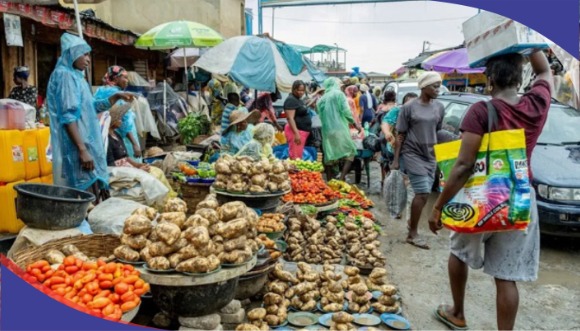News
‘Food Items are Now Cheap’: Relief for Nigerians as Prices of Rice, Garri, Others Drop in States
Some traders and agriculture stakeholders in Ogun, Oyo, and Kwara States have expressed delight at the drop in food prices, praising the Federal Government for its policies and interventions.

- Some traders and agriculture stakeholders in Ogun, Oyo, and Kwara States have expressed delight at the drop in food prices, praising the Federal Government for its policies and interventions.
Some traders and agriculture stakeholders in Ogun, Oyo, and Kwara States have expressed delight at the drop in food prices, praising the Federal Government for its policies and interventions.
According to a survey conducted by the News Agency of Nigeria on Tuesday, the respondents, however, cautioned that some loose ends needed to be tidied up to sustain the price reductions across the board.
The survey revealed that there is a significant drop in the prices of rice, beans, garri, groundnut oil and yams at the Lafenwa, Kuto and Olomore markets in Abeokuta.
It also showed that the prices of perishable items like peppers, onions, and tomatoes had dropped.
According to the findings, a ‘kongo’ of garri now sells for N500, down from N1,800 in August, while a full bag has dropped to N28,000 from N40,000.
A 50kg bag of rice now goes for N53,000, compared to N68,000 in August, and ‘Oloyin’ beans have fallen from N70,000 to N60,000.
The price of a 5-litre gallon of groundnut oil has reduced from N16,000 to N13,000, while a 25-litre keg of King’s oil decreased from N70,000 to N66,000.
Onion prices have also dropped sharply: a medium basket fell from N20,000 to N12,000, and a small basket from N10,000 to N5,000.
In the same vein, a big bag of scotch bonnet pepper now sells for N35,000 to N40,000, down from N60,000 to N65,000. The small bucket of the same pepper, previously priced at N15,000, now costs N6,000.
A bag of tomatoes has also dropped significantly, falling from N70,000 to N50,000.
In the yam markets, six big tubers that once sold for N17,000 to N20,000 now go for N12,000, while medium-sized tubers currently sell for N4,000 to N6,000.

Some traders attributed the price reduction to the recent decline in the exchange rate and the reopening of land borders.
According to Sikirat Soyeye, a grain seller at Lafenwa Market, these developments have eased importation and improved the availability of key food items, especially rice and groundnut oil.
She said, “Our businesses have improved; since food items are now cheaper, people are now buying more.
“The reduction in the dollar rate and border reopening have really helped.”
Soyeye, however, appealed to the government to sustain the stability of the naira, adding that traders now record higher sales and patronage.
Also at the Kuto Market, Tinuke Ayomide, a perishable goods seller, said the reduction in the prices of pepper and onions was due to the current harvest season of the items.
Ayomide, however, urged the government to strengthen security, particularly in the northern parts of the country where most food items originate, to ensure a steady reduction in commodity prices.
A tomato seller at Olomore market, Mr Haruna Ibrahim, said the commodity recorded a slight price reduction, but compared with other items, it was still expensive. According to him, the drop in the prices of perishable food is due to seasonal harvests.
A buyer, Ayomide Adedeji said she was happy at the recent drop in prices of tomato while also urging the government to sustain the trend through consistent policies.
“Food prices should not rise again, and the government must keep fuel prices stable.
“When the dollar comes down, things become cheaper, so the government must ensure exchange rate stability and continue to support local farmers,” she said.
Speaking on the issue, the Ogun Secretary, All Farmers Association of Nigeria, Abiodun Ogunjimi, attributed the drop in prices to a mix of seasonal harvests, reduced transport costs, and improved supply from farms and borders.
He, however, warned that if the government fails to follow up with strategic policies, the market may witness another price surge.
Ogunjimi said, “To sustain this positive trend, the government should invest in local food production, reduce import duties on essential goods, and provide incentives for farmers.
“Our government should also look into improved storage facilities, rural infrastructure, and price monitoring systems to prevent future inflation and ensure food affordability for Nigerians.”
On his part, Commissioner for Agriculture and Food Security in Ogun State, Bolu Owotomo, said the reduction in food prices was due to effective government policies, even as the harvest season is ongoing.
He said the state government had intensified efforts to boost food production and reduce post-harvest losses through a series of targeted initiatives and interventions.
DON’T MISS: BREAKING: Police, Military Launch Massive Operation to Rescue 25 Abducted Schoolgirls
According to him, the state has recorded remarkable progress in the cassava value chain and aquaculture sector, with thousands of farmers benefiting from capacity-building programmes.
The commissioner added that the government had continued to expand its agricultural input distribution to enhance productivity, while also constructing processing facilities across the state to strengthen the food supply system.
“We’re not only stopping at providing processing centres, we are also linking our farmers to off-takers so that they won’t have to be the ones to be looking for markets themselves; we already have off-takers registered.
“It’s our joy that the government’s policies and interventions are having a positive impact on food prices in the state.
“Adequate state government interventions have really helped in the reduction of food prices,” said Owotomo.
In Ibadan, Alarudeen Aminu, a Reader in the Department of Economics, University of Ibadan, says the price reduction is largely driven by the nationwide harvest season.
He said food prices traditionally fall to their lowest during harvest periods across Nigeria’s agro-ecological zones.

“This year’s trend aligns with historical patterns, except in periods of drought, flood or other disruptions affecting food production,” he said.
He explained that increased local supply has forced imported food items to a downward readjustment.
“If there is excess supply, the price will fall to clear the market. That is what we are observing now,” he said.
Although the data released by the Bureau of Statistics stated that there is a drop in the country’s inflation, the impact is yet to be felt by the majority of Nigerians. Many of them claim that the inflation drop is not translating into the prices of goods and services, including the cost of living.






















